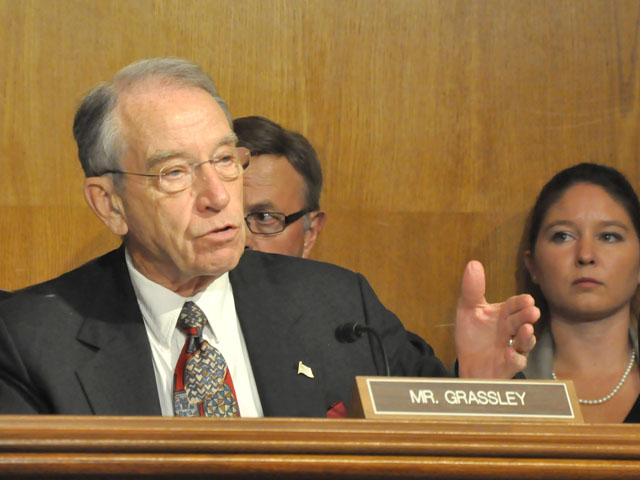Ethanol COVID-19 Relief Gains Momentum
House, Senate Bills Would Provide Financial Assistance to Biofuel Producers
OMAHA (DTN) -- One way or another, the ethanol industry is hopeful any additional COVID-19 relief package coming from Congress will include some form of financial relief for the industry.
This week, Sens. Chuck Grassley, R-Iowa, and Amy Klobuchar, D-Minn., introduced legislation to provide reimbursements to ethanol producers for feedstock purchases made dating back to the first quarter of 2020.
Last Friday, the United States House of Representatives passed a COVID-19 bill that includes a proposed 45-cent-per-gallon payment to ethanol producers.
In addition, economic conditions for producers have started to improve. Ethanol stocks have come down and demand has started to rise.
"It is very encouraging to see positive trends," Emily Skor, CEO of Growth Energy, said during a call with producers on Wednesday.
"We're continuing to see our opposition making requests to take our market share. Most important for us is that, in the next package, it includes biofuels relief."
If there's anything positive the ethanol industry can take from the pandemic, Skor said, a conversation about air quality has emerged in Washington in light of reduced pollution during the shutdown. She said there are some "constructive conversations" to preserve the changes to include an expanded role for ethanol.
Iowa Renewable Fuels Association Executive Director Monte Shaw said in a news statement on Wednesday that the pandemic has hit Iowa's ethanol industry hard with about 40% of the state's production offline.
"Without economic help, many plants may lack the necessary resources to purchase corn and resume production, even as more Americans head back to work and demand begins its long, slow climb back to normal levels," he said.
P[L1] D[0x0] M[300x250] OOP[F] ADUNIT[] T[]
Renewable Fuels Association President and CEO Geoff Cooper said about 60 of the nation's 204 ethanol plants are running at normal output while 144 are either offline or have scaled back production. More than 40% of the county's ethanol production capacity remains offline.
"The COVID-19 pandemic has had devastating effects on the U.S. ethanol industry," Cooper said in a statement.
"Tens of thousands of good jobs in rural communities are in jeopardy as fuel demand has plummeted and scores of ethanol plants have been forced to shut down. Fortunately, Sens. Grassley and Klobuchar are watching out for the 350,000 men and women whose jobs are supported by the ethanol industry. The legislation they introduced today would lend a vital helping hand and assist renewable fuel producers as they attempt to get back on their feet."
American Coalition for Ethanol CEO Brian Jennings said direct assistance will be needed if the industry is to "survive this catastrophic" downturn.
"Momentum for direct assistance is building in Congress, so we thank ACE's grassroots members for urging bipartisan and bicameral support for immediate aid, but we are far from the finish line as the Senate may not take up the next stimulus package until sometime in June," he said in a statement.
Kurt Kovarik, vice president for federal affairs at the National Biodiesel Board, said any help the biodiesel industry can get would help soybean farmers.
"Biodiesel production supports 13% of the value of each bushel of U.S. soybeans," he said in a statement.
"Maintaining a strong biodiesel industry is vital to keeping America's critical agricultural infrastructure healthy."
OTHER DEVELOPMENTS
The U.S. Supreme Court on Monday rejected a petition to consider whether the EPA should be changing the point of obligation in the RFS.
Valero Energy Corp. and the American Fuel and Petrochemical Manufacturers petitioned the court back in January.
Currently, refiners and fuel importers are obligated parties in the RFS. The agency has been petitioned several times to consider instead requiring fuel blenders to follow the RFS.
In the petition filed with the high court on Dec. 30, 2019, the plaintiffs argued the EPA has violated the law by not considering such petitions. The refiners and petroleum groups argue that EPA is required annually to consider specific elements under the RFS but has refused to look at changes to the point of obligation.
Shifting the point of obligation to "blenders" has been an ongoing source of friction with refiners. In 2016, a refiner petitioned EPA to shift the point of obligation to owners of the fuel at the rack who pay excise taxes on the fuel. The rack price is the price refiners charge to sell their gasoline to various clients.
On another topic, while the EPA continues to receive requests to waive RFS volumes in light of COVID-19, Growth Energy's General Counsel and Corporate Secretary Joe Kakesh said during the group's call on Wednesday that, by the middle of June, the agency should be releasing the proposed 2021 Renewable Fuel Standard volume obligations.
Because gasoline demand has fallen off a cliff since the start of the COVID-19 economic shutdown, Kakesh said Growth Energy will be watching what numbers the agency uses in making fuel-use projections.
Todd Neeley can be reached at todd.neeley@dtn.com
Follow him on Twitter @toddneeleyDTN
(c) Copyright 2020 DTN, LLC. All rights reserved.



